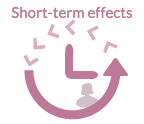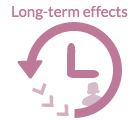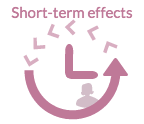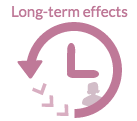What are the physical and mental health effects of FGM/C?
Physical effects of FGM/C
Undergoing FGM/C can cause both immediate and long-term physical consequences.1 Young girls and women may experience more than one of the health complications below. This list is not exhaustive and many women and young girls may be experiencing physical health effects that are not known to us. We are still learning about all the ways in which FGM/C can cause health complications.

- Severe pain2,3,4,5
- Excessive bleeding2,3,4,5
- Bacterial or viral infection2,3,5
- Injury to surrounding area, including swelling2,3,5
- Not being able to urinate2,4,5

Mental health effects of FGM/C
Female genital mutilation/cutting (FGM/C) can affect a woman's mental health long after the procedure, into her adult life. Women with FGM/C often show signs of psychological trauma: anxiety, somatization, depression, post-traumatic stress and other mood disorders.8 There are few studies that examine how FGM/C can affect a child's mental health. One study found that young girls who experienced physical health effects after the cutting, whether short term (bleeding) or long term (urinary issues), were more likely to feel depressed.9 Another study showed that adolescent girls who had undergone FGM/C were more likely to have depression, anxiety, phobias and hostility towards others.10 More studies are needed to fully understand what the effects are on young girls.8 We don't know how age of cutting/mutilation, severity of FGM/C, and presence of chronic health issues may affect the mental health of children and adolescents.


Women who have undergone genital mutilation may also experience:
Isolation
Women report that they are unable to discuss their FGM/C with friends, doctors or partners because of the stigma surrounding the practice. Women also said they are “missing out” on important experiences, particularly in intimate relationships. This comes out when friends share their own positive sexual experiences.*
Frustration and confusion
Women may not necessarily know how FGM/C affects their physical health. Having undergone genital cutting at a young age, women said they did not know what was “normal” in the context of their health. They may not know that the several negative physical symptoms they are experiencing are a result of cutting. Women who are aware of how FGM/C affected their health report feeling a sense of resignation. They feel there is nothing they can do to improve their symptoms.16
Anger
Women who have undergone FGM/C also report feelings of anger, particularly at family members who have violated their trust.11,17
*George Washington University Milken Institute School of Public Health original study, 2018-19.
Page last reviewed: May 11, 2023
Page last updated: April 7, 2023
This toolkit was produced by George Washington University with under 2020-V3-GX-K009, awarded by the Office for Victims of Crime, Office of Justice Programs, U.S. Department of Justice. The opinions, findings, and conclusions or recommendations expressed in this presentation are those of the contributors and do not necessarily represent the official position or policies of the U.S. Department of Justice.

